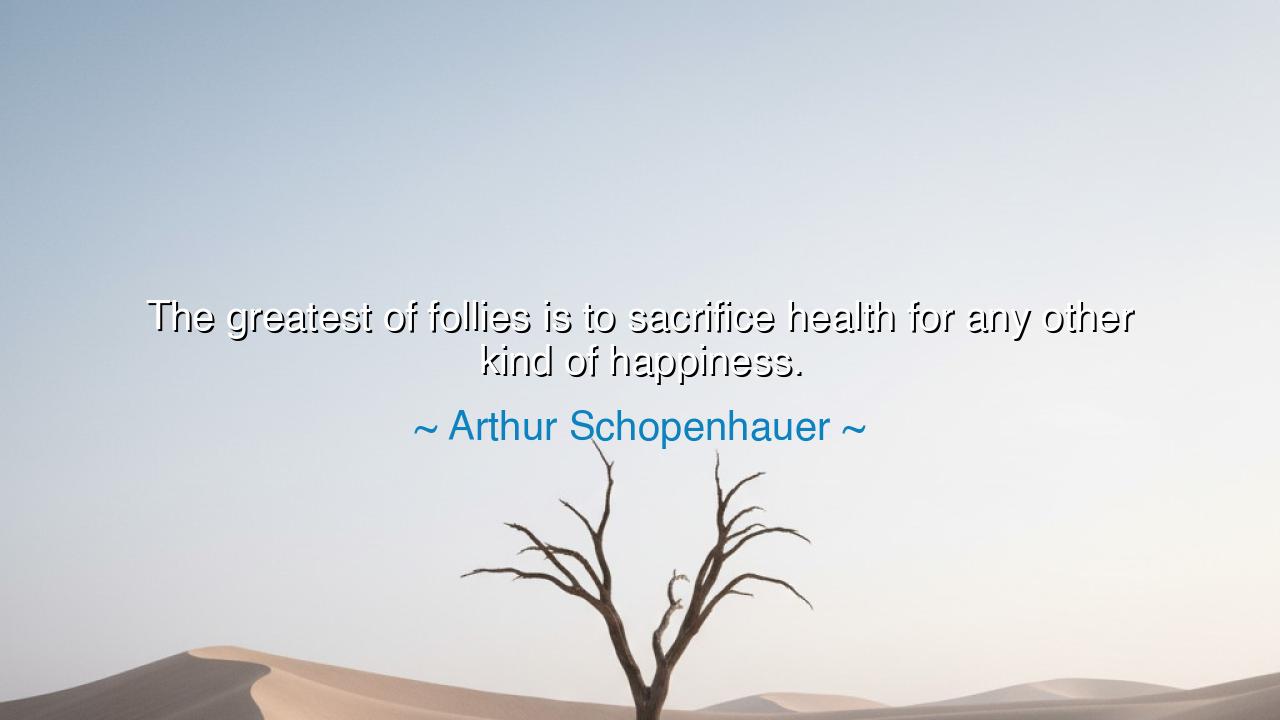
The greatest of follies is to sacrifice health for any other kind






“The greatest of follies is to sacrifice health for any other kind of happiness.” Thus spoke Arthur Schopenhauer, the somber philosopher who looked deeply into the soul of human desire and found there a great contradiction — that men chase pleasure while destroying the very vessel that allows them to feel it. In this timeless truth, Schopenhauer warns that all happiness without health is an illusion, a flicker of light upon a crumbling foundation. For what joy can remain when the body is broken, when the mind is clouded by pain, and the spirit is chained by exhaustion? To destroy one’s health in pursuit of pleasure is to drink poison in search of sweetness.
Born in an age of great intellect and restlessness, Schopenhauer observed that people often live as slaves to desire — sacrificing rest for ambition, peace for indulgence, and vitality for vanity. He saw that humanity, blinded by longing for wealth, fame, or sensual delight, forgets that these things cannot be savored without the strength of the body and the clarity of the mind. To him, health was not merely the absence of illness, but the very essence of being. “A healthy beggar,” he once said, “is happier than an ailing king.” His wisdom reminds us that the crown of true happiness rests not upon gold or glory, but upon the simple, unyielding foundation of well-being.
The ancients, too, revered this truth. The Greeks honored Asclepius, the god of healing, above even those who promised power or riches. The Stoic Seneca wrote that it is madness to pursue pleasure at the cost of strength, for “pleasure dies, but weakness remains.” And in the East, the sages of China taught that harmony between body and spirit was the first step toward enlightenment. For they knew, as Schopenhauer knew, that the body is the temple of the soul — and that to neglect it is to defile one’s own sacred dwelling.
Consider the story of Napoleon Bonaparte, whose ambition burned brighter than the sun. He conquered nations, bent kings to his will, and built an empire that shook the world. Yet his health, weakened by ceaseless toil, poor diet, and sleepless nights, betrayed him. In his final years, imprisoned and sickly, he confessed that all his victories were ashes in his mouth. His empire had crumbled, but more than that — his body, the very engine of his genius, had withered away. He, who once commanded millions, could not command his own pain. In this, we see Schopenhauer’s warning fulfilled: all happiness that demands the sacrifice of health ends in emptiness.
For what is wealth to the man too weak to enjoy it? What is success to the one who must rest in bed while others celebrate? And what is love itself if the heart beats not with vitality, but with fatigue? Many chase pleasures that consume them — the businessman who works until his spirit collapses, the reveler who drinks until his laughter turns to silence, the dreamer who burns the midnight oil until his flame grows dim. Each believes he is pursuing happiness, yet each, unknowingly, is trading it away.
Schopenhauer, though a philosopher of melancholy, offers not despair, but a call to wisdom. He teaches that moderation is the guardian of health, and health the foundation of all enduring joy. To honor the body is to honor life itself. When we nourish, rest, and care for it, we preserve the sacred instrument through which all pleasure, knowledge, and love are experienced. It is not selfish to care for one’s health; it is a duty — for without it, we cannot serve, create, or rejoice. The wise understand that the strongest house is not the grandest, but the one with firm foundations.
So, dear listener, remember this: let no ambition, no indulgence, no fleeting thrill tempt you to betray your health. Guard it as your most precious treasure, for upon it depends all else that makes life beautiful. Rise early, breathe deeply, eat mindfully, and let rest and joy walk hand in hand. Seek happiness, yes — but seek it through balance, not excess. For as Schopenhauer teaches, the man who protects his health possesses a wealth that fortune cannot bestow and fate cannot steal.
Practical actions for the seeker: Begin each day with gratitude for the gift of your body. Feed it with clean food, strengthen it with movement, and calm it with stillness. Set limits upon labor and indulgence alike. Remember that no success is worth the price of exhaustion, and no pleasure worth the decay of your strength. Let your health be the foundation of your joy, not the cost of it. For the one who preserves his body preserves his soul — and in that harmony, he shall find true and lasting happiness.






AAdministratorAdministrator
Welcome, honored guests. Please leave a comment, we will respond soon